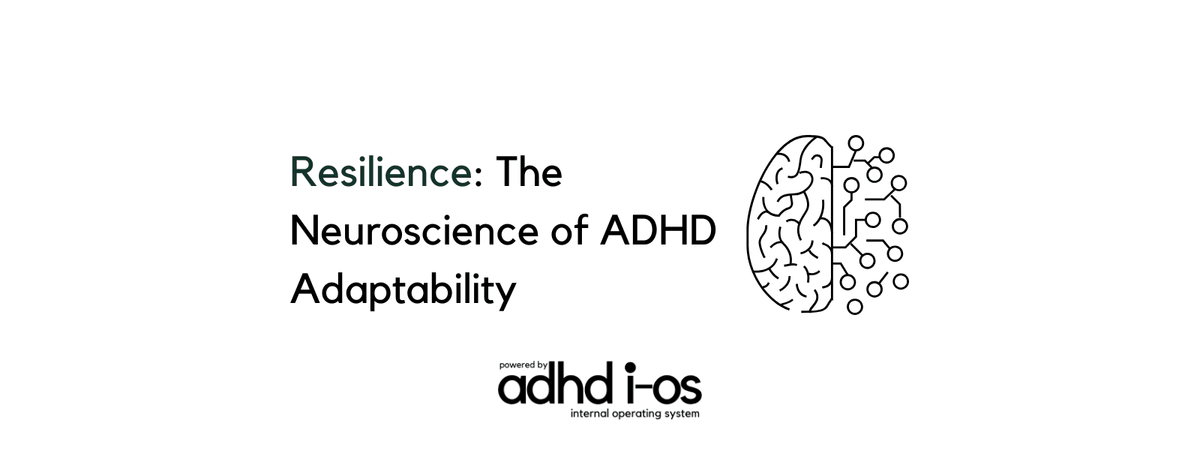Resilience: The Neuroscience of ADHD Adaptability
Resilience: The Neuroscience of ADHD Adaptability
Resilience: The Neuroscience of ADHD Adaptability
Ever been told you’re too sensitive, too reactive, or just not trying hard enough?
If you have ADHD, chances are you’ve heard it all. But what if those moments of struggle, reactivity, and starting over aren’t failures?
What if they’re actually signs of strength?
Resilience in ADHD doesn’t always look like grit or consistency. Sometimes, it looks like rebuilding after burnout, finding the humor in chaos, or creating a new system out of sheer necessity. It’s not about pushing through like everyone else. It’s about adapting in a world that rarely meets you halfway.

What Makes ADHD Brains Uniquely Resilient?
Let’s be real: ADHDers face more rejection, more trial-and-error, and more daily overwhelm than most. And yet many bounce back. Again and again.
This isn’t just about mindset. ADHD resilience is rooted in neurological wiring that allows for constant adaptation. That means:
- Brains that rewire after setbacks
- Emotional responses that drive creativity
- Systems built on trial-and-error, not perfection
Emotional regulation challenges in ADHD often require creative coping. But this kind of persistence is a powerful survival skill not a flaw.
The Neuroscience Behind ADHD Resilience
ADHD brains are more likely to seek out novelty. This heightened tendency towards plasticity allows ADHD-ers to form new neural pathways especially when navigating change or stress.
This means:
- Learning happens through lived experience
- Setbacks become feedback loops for new strategies
Your brain is wired to adapt. You just need to know how to harness this wiring and use it to navigate the world, which is still largely aligned with neurotypical living.
Dopamine Dysregulation Means Creative Adaptation
Low and fluctuating dopamine is a core ADHD trait. It’s one reason tasks feel boring one minute and addictive the next. But this inconsistency also drives innovation:
- ADHDers seek novelty, variety, and meaning
- We build workarounds that keep things interesting to stay engaged
The key is understanding your own preferences and responses, and creating environments that allow you to seek variety and meaning even as you pursue a goal.
Stress Response: Hypersensitivity Meets Innovation
Yes, ADHD brains may feel stress more intensely. But many also develop clever, adaptive mechanisms to regulate that overwhelm, especially when left unsupported by traditional systems.
This means resilience shows up not as calm… but as resourcefulness.
Everyday Signs of ADHD Resilience
ADHD resilience isn’t always tidy. But it’s real. Here’s what it can actually look like:
Reframing failure into curiosity (“What can I learn from this?”)
- Using humor to lighten emotional weight
- Creating workarounds that others don’t even see
- Advocating for your needs when systems fail you
- Turning rejection into redirection
Building ADHD Resilience Intentionally
Resilience can be practiced, especially with ADHD-informed strategies:
Strategy - Self-compassion
Why It Helps - Quiets shame spirals and builds momentum
Strategy - Body doubling/co-regulation
Why It Helps - External support helps regulate emotions + focus
Strategy - Mistakes = Data
Why It Helps - Keeps setbacks from becoming spirals
Strategy - Nervous system resets
Why It Helps - Helps you move out of freeze or overwhelm
Strategy - Personalized systems
Why It Helps - Reinforces adaptability as a core strength—not a last resort
ADHD Doesn’t Break You, it Builds You Differently
ADHD resilience isn’t always graceful. It’s not always visible. But it’s powerful. It’s the ability to fall down ten times and rewire the strategy on the eleventh. It’s doing things differently, because different is what works for your brain.
Try this:
Think of one moment this week where you adapted in a way no one saw but you did. That’s resilience. Don’t discount it.
Want Real-Life Tools That Actually Work?
Join the adhd i-os community to get:
- Weekly science-backed ADHD strategies
- Real talk about what actually works
- Support built for how your brain really works
Your adaptability isn’t accidental, it’s neurological. Let’s make it your superpower.

